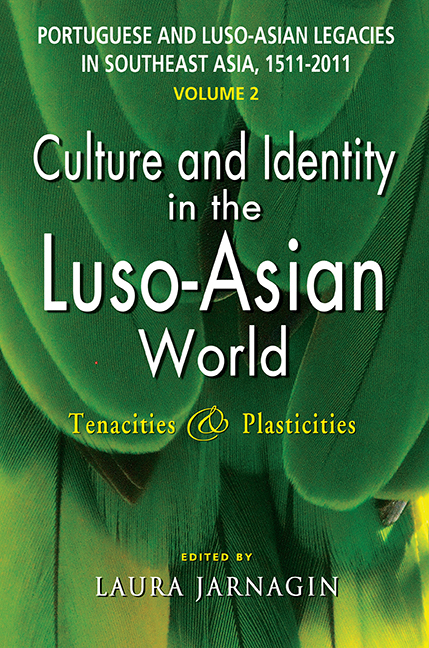 Portuguese and Luso-Asian Legacies in Southeast Asia, 1511-2011, vol. 2
Portuguese and Luso-Asian Legacies in Southeast Asia, 1511-2011, vol. 2 Book contents
- Frontmatter
- Contents
- List of Figures and Tables
- Preface
- List of Contributors
- Glossary
- Introduction: The Qualitative Properties of Cultures and Identities
- Part One Crafting Identity in the Luso-Asian World
- 1 Catholic Communities and Their Festivities under the Portuguese Padroado in Early Modern Southeast Asia
- 2 A “Snapshot” of a Portuguese Community in Southeast Asia: The Bandel of Siam, 1684–86
- 3 The Colonial Command of Ceremonial Language: Etiquette and Custom-Imitation in Nineteenth-Century East Timor
- 4 Remembering the Portuguese Presence in Timor and Its Contribution to the Making of Timor's National and Cultural Identity
- Part Two Cultural Components: Language, Architecture and Music
- Part Three Adversity and Accommodation
- Appendix: Maps
- Bibliography
- Index
- Titles in the Nalanda-Sriwijaya Studies Centre Series
3 - The Colonial Command of Ceremonial Language: Etiquette and Custom-Imitation in Nineteenth-Century East Timor
from Part One - Crafting Identity in the Luso-Asian World
Published online by Cambridge University Press: 21 October 2015
- Frontmatter
- Contents
- List of Figures and Tables
- Preface
- List of Contributors
- Glossary
- Introduction: The Qualitative Properties of Cultures and Identities
- Part One Crafting Identity in the Luso-Asian World
- 1 Catholic Communities and Their Festivities under the Portuguese Padroado in Early Modern Southeast Asia
- 2 A “Snapshot” of a Portuguese Community in Southeast Asia: The Bandel of Siam, 1684–86
- 3 The Colonial Command of Ceremonial Language: Etiquette and Custom-Imitation in Nineteenth-Century East Timor
- 4 Remembering the Portuguese Presence in Timor and Its Contribution to the Making of Timor's National and Cultural Identity
- Part Two Cultural Components: Language, Architecture and Music
- Part Three Adversity and Accommodation
- Appendix: Maps
- Bibliography
- Index
- Titles in the Nalanda-Sriwijaya Studies Centre Series
Summary
Throughout the nineteenth century, Timor was perceived as Portugal's most remote colonial province, a problematic remnant of the Portuguese maritime empire in Asia. The island was geographically isolated and the administration was militarily weak, economically poor, and enmeshed in multiple political and military conflicts, either between the colonizers and the indigenous, or among colonizers themselves. This marginal, weak and atavistic colonial condition was associated with a ceremonial style of administration. Although the Portuguese governors envisaged an administration modelled on the example of “modern” European and imperial state bureaucracies, territorial occupation, economic order and military organization, the fact was that, in practice, they felt the need to engage and reproduce old local institutions and traditions, deeply rooted in the government praxis of the colony. Indeed, the idea of sacred age-old custom — usually under the name of estilos — was a main source of legitimacy and normative supervision of colonial domination as “traditional authority”. As one governor declared in 1901, the governor's authority could only aspire to indigenous recognition because of and “in accordance with the estilos”.
Regardless of their being perceived as barbarian, abhorrent, feudal or old-fashioned by nineteenth-century Portuguese, many of these estilos of administration could not be easily dismissed or modified in practice without serious consequences for colonial authority. Thus the Portuguese in Timor felt compelled to copy and reproduce a number of locally meaningful ancient sociopolitical customs, norms and ceremonies, of which they were important actors. The origin of many of these estilos could be traced to manners and customs introduced in Timor by former Portuguese agents in the early modern period. But by the nineteenth century they were fundamental to the survival of colonial authority in the present, and they were not “Portuguese” customs any more. They were a legacy of the past that had been creatively integrated and adopted as lawful by the people and the elites in the Timorese kingdoms. In other words, this legacy had already become a form of “indigenous” ancient custom, and as such was valued by the Timorese.
- Type
- Chapter
- Information
- Portuguese and Luso-Asian Legacies in Southeast Asia, 1511-2011, vol. 2Culture and Identity in the Luso-Asian World: Tenacities & Plasticities, pp. 67 - 87Publisher: ISEAS–Yusof Ishak InstitutePrint publication year: 2012


